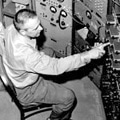
Clyde Cowan
Clyde Cowan (December 6, 1919 to May 24, 1974) Clyde Cowan and Frederick Reines experimentally discovered neutrinos in 1956. The 1995 Nobel Prize in physics was awarded for this discovery to Reines, as Cowan had died in 1974 and Nobel Prizes are not awarded posthumously. In his Nobel Lecture, Reines said, “I must mention my very good friend and colleague Clyde Cowan, who was an equal partner in the experiments to discover the neutrino. I regret that he did not live long enough to share in this honor with me.” (https://www.nobelprize.org/uploads/2018/06/reines-lecture.pdf) Neutrinos are fundamental particles, closely related to the electron but electrically neutral. They were hypothesized to exist by Wolfgang Pauli in 1930 to explain why energy and angular momentum did not seem to be conserved in “beta decay” processes. Pauli’s idea was that a new unobserved particle carried off energy and angular momentum from these processes. Because these particles would interact only via the “Weak force,” but not via the electromagnetic and Strong forces, it was thought for decades that they would be impossible to detect in practice. Nevertheless, in 1951, Cowan and Reines decided to try. The idea they eventually came up with was to use the very intense flux of neutrinos produced by a nuclear reactor and the immense number of proton “targets” contained in a large vat of water to compensate for the small interaction rate of neutrinos. In 1956, their long quest met with success. This opened the way for major developments in several areas of physics. Far from neutrinos being “unobservable,” beams of neutrinos became a major tool in probing subatomic physics. The detection of neutrinos produced in the Sun and by cosmic rays (using methods similar to that of Cowan and Reines) showed that different types of neutrinos morph into each other (“neutrino oscillations”), one of the major discoveries in particle physics in recent decades. “Neutrino telescopes” have been built to detect neutrinos from astrophysical sources such as supernovae. This is all an outgrowth of Cowan and Reines’s visionary work. A video of a lecture by Cowan explaining his Nobel-Prize-winning experiment with Reines can be found here.
Clyde Cowan was a devout Catholic. His faith gave him strength and consolation in the face of numerous family tragedies, including the death in infancy of several children. He was an active member of Catholic organizations, including the Knights of Columbus.
Explore Other Scientists
It is our hope that this curated set of biographies will be useful to teachers, students, and the general public.